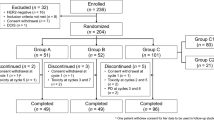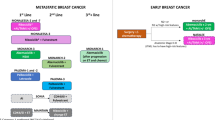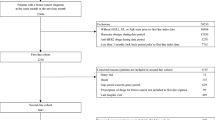Abstract
Purpose
Everolimus in combination with endocrine therapy (ET) was formerly approved as 2nd-line therapy in HR(+)/HER2(−) advanced breast cancer (aBC) patients (pts) progressing during or after a non-steroidal aromatase inhibitor (NSAI). Since this approval, the treatment landscape of aBC has changed dramatically, particularly with the arrival of CDK 4–6 inhibitors. Endocrine monotherapy after progression to CDK4/6 inhibitors has shown a limited progression-free survival (PFS), below 3 months. Evidence of the efficacy of everolimus plus ET after CDK4/6 inhibitors is scarce.
Methods
A retrospective observational study of patients with aBC treated with everolimus and ET beyond CDK4/6-i progression compiled from February 2015 to December 2022 in 4 Spanish hospitals was performed. Clinical and demographic data were collected from medical records. The main objective was to estimate the median progression-free survival (mPFS). Everolimus adverse events (AE) were registered. Quantitative variables were summarized with medians; qualitative variables with proportions and the Kaplan–Meier method were used for survival estimates.
Results
One hundred sixty-one patients received everolimus plus ET (exemestane: 96, fulvestrant: 54, tamoxifen: 10, unknown: 1) after progressing on a CDK4/6 inhibitor. The median follow-up time was 15 months (interquartile range: 1–56 months). The median age at diagnosis was 49 years (range: 35–90 years). The estimated mPFS was 6.0 months (95%CI 5.3–7.8 months). PFS was longer in patients with previous CDK4/6 inhibitor therapy lasting for > 18 months (8.7 months, 95%CI 6.6–11.3 months), in patients w/o visceral metastases (8.0 months, 95%CI 5.8–10.5 months), and chemotherapy-naïve in the metastatic setting (7.2 months, 95%CI 5.9–8.4 months).
Conclusion
This retrospective analysis cohort of everolimus plus ET in mBC patients previously treated with a CDK4/6 inhibitor suggests a longer estimated mPFS when compared with the mPFS with ET monotherapy obtained from current randomized clinical data. Everolimus plus ET may be considered as a valid control arm in novel clinical trial designs.

Similar content being viewed by others
Data availability
Research data can be provided by the authors per request.
References
Malmgren JA, Mayer M, Atwood MK et al (2018) Differential presentation and survival of de novo and recurrent metastatic breast cancer over time: 1990–2010. Breast Cancer Res Treat 167(2):579–590
Pan H, Gray R, Braybrooke J et al (2017) 20-Year risks of breast-cancer recurrence after stopping endocrine therapy at 5 years. N Engl J Med 377(19):1836–1846
Gennari A, André F, Barrios CH, Cortés J, de Azambuja E, DeMichele A, Dent R, Fenlon D, Gligorov J, Hurvitz SA, Im SA, Krug D, Kunz WG, Loi S, Penault-Llorca F, Ricke J, Robson M, Rugo HS, Saura C, Schmid P, Singer CF, Spanic T, Tolaney SM, Turner NC, Curigliano G, Loibl S, Paluch-Shimon S, Harbeck N, ESMO Guidelines Committee (2021) ESMO clinical practice guideline for the diagnosis, staging and treatment of patients with metastatic breast cancer. Ann Oncol 32(12):1475–1495. https://doi.org/10.1016/j.annonc.2021.09.019
Turner NC, Ro J, André F et al (2015) Palbociclib in hormone-receptor- positive advanced breast cancer. N Engl J Med 373(3):209–219
Hortobagyi GN, Stemmer SM, Burris HA, Yap YS, Sonke GS, Hart L, Campone M, Petrakova K, Winer EP, Janni W, Conte P, Cameron DA, André F, Arteaga CL, Zarate JP, Chakravartty A, Taran T, Le Gac F, Serra P, O’Shaughnessy J (2022) Overall survival with ribociclib plus letrozole in advanced breast cancer. N Engl J Med 386(10):942–950. https://doi.org/10.1056/NEJMoa2114663
Goetz MP, Toi M, Campone M et al (2017) MONARCH 3: abemaciclib as initial therapy for advanced breast cancer. J Clin Oncol 35(32):3638–3646
Cardoso F, Paluch-Shimon S, Senkus E, Curigliano G, Aapro MS, André F et al (2020) 5th ESO-ESMO international consensus guidelines for advanced breast cancer (ABC 5). Ann Oncol 31(12):1623–1649. https://doi.org/10.1016/j.annonc.2020.09.010
Hanker AB, Sudhan DR, Arteaga CL (2020) Overcoming endocrine resistance in breast cancer. Cancer Cell 37(4):496–513. https://doi.org/10.1016/j.ccell.2020.03.009
Garcia-Martinez L, Zhang Y, Nakata Y, Chan HL, Morey L (2021) Epigenetic mechanisms in breast cancer therapy and resistance. Nat Commun 12(1):1786. https://doi.org/10.1038/s41467-021-22024-3
Baselga J, Campone M, Piccart M, Burris HA 3rd, Rugo HS, Sahmoud T, Noguchi S, Gnant M, Pritchard KI, Lebrun F, Beck JT, Ito Y, Yardley D, Deleu I, Perez A, Bachelot T, Vittori L, Xu Z, Mukhopadhyay P, Lebwohl D, Hortobagyi GN (2012) Everolimus in postmenopausal hormone-receptor-positive advanced breast cancer. N Engl J Med 366(6):520–529. https://doi.org/10.1056/NEJMoa1109653
Kornblum N, Zhao F, Manola J, Klein P, Ramaswamy B, Brufsky A et al (2018) Randomized phase II trial of fulvestrant plus everolimus or placebo in postmenopausal women with hormone receptor-positive, human epidermal growth factor receptor 2-negative metastatic breast cancer resistant to aromatase inhibitor therapy: results of PrE0102. J Clin Oncol 36(16):1556–1563. https://doi.org/10.1200/JCO.2017.76.9331
Schmid P, Zaiss M, Harper-Wynne C, Ferreira M, Dubey S, Chan S et al (2019) Fulvestrant plus vistusertib vs fulvestrant plus everolimus vs fulvestrant alone for women with hormone receptor-positive metastatic breast cancer: the MANTA phase 2 randomized clinical trial. JAMA Oncol 5(11):1556–1564. https://doi.org/10.1001/jamaoncol.2019.2526
Lindeman GJ, Fernando TM, Bowen R, Jerzak KJ, Song X, Decker T et al (2022) VERONICA: randomized phase II study of fulvestrant and venetoclax in ER-positive metastatic breast cancer post-CDK4/6 inhibitors—efficacy, safety, and biomarker results. Clin Cancer Res 28(15):3256–3267. https://doi.org/10.1158/1078-0432.CCR-21-3811
Kalinsky K, Accordino MK, Chiuzan C, Mundi PS, Sakach E, Sathe C et al (2023) Randomized phase II trial of endocrine therapy with or without ribociclib after progression on cyclin-dependent kinase 4/6 inhibition in hormone receptor-positive, human epidermal growth factor receptor 2-negative metastatic breast cancer: MAINTAIN Trial. J Clin Oncol 41(24):4004–4013. https://doi.org/10.1200/JCO.22.02392
Bidard FC, Kaklamani VG, Neven P, Streich G, Montero AJ, Forget F et al (2022) Elacestrant (oral selective estrogen receptor degrader) versus standard endocrine therapy for estrogen receptor-positive, human epidermal growth factor receptor 2-negative advanced breast cancer: results from the randomized phase III EMERALD trial. J Clin Oncol 40(28):3246–3256. https://doi.org/10.1200/JCO.22.00338
Oliveira M, Pominchuk D, Nowecki Z, Hamilton E, Kulyaba Y, Andabekov T et al (2023) GS3-02 camizestrant, a next generation oral SERD vs fulvestrant in post-menopausal women with advanced ER-positive HER2-negative breast cancer: results of the randomized, multi-dose phase 2 SERENA-2 trial. Cancer Res 83(5):GS3-02. https://doi.org/10.1158/1538-7445.SABCS22-GS3-02
Dhakal A, Antony Thomas R, Levine EG et al (2020) Outcome of everolimus- based therapy in hormone-receptor-positive metastatic breast cancer patients after progression on palbociclib. Breast Cancer (Auckl) 14:1178223420944864
Mo H, Renna CE, Moore HCF, Abraham J, Kruse ML, Montero AJ, LeGrand SB, Wang L, Budd GT (2022) Real-world outcomes of everolimus and exemestane for the treatment of metastatic hormone receptor-positive breast cancer in patients previously treated With CDK4/6 inhibitors. Clin Breast Cancer 22(2):143–148. https://doi.org/10.1016/j.clbc.2021.10.002
Cook MM, Al Rabadi L, Kaempf AJ, Saraceni MM, Savin MA, Mitri ZI (2021) Everolimus plus exemestane treatment in patients with metastatic hormone receptor-positive breast cancer previously treated with CDK4/6 inhibitor therapy. Oncologist 26(2):101–106. https://doi.org/10.1002/onco.13609
Karacin C, Oksuzoglu B, Demirci A, Keskinkılıç M, Baytemür NK, Yılmaz F et al (2023) Efficacy of subsequent treatments in patients with hormone-positive advanced breast cancer who had disease progression under CDK 4/6 inhibitor therapy. BMC Cancer 23(1):136. https://doi.org/10.1186/s12885-023-10609-8
Rozenblit M, Mun S, Soulos P, Adelson K, Pusztai L, Mougalian S (2021) Patterns of treatment with everolimus exemestane in hormone receptor-positive HER2-negative metastatic breast cancer in the era of targeted therapy. Breast Cancer Res 23(1):14. https://doi.org/10.1186/s13058-021-01394-y
Turner NC, Oliveira M, Howell SJ, Dalenc F, Cortes J, Gomez Moreno HL, Hu X, Jhaveri K, Krivorotko P, Loibl S, Morales Murillo S, Okera M, Park YH, Sohn J, Toi M, Tokunaga E, Yousef S, Zhukova L, de Bruin EC, Grinsted L, Schiavon G, Foxley A, Rugo HS, CAPItello-291 Study Group (2023) Capivasertib in hormone receptor-positive advanced breast cancer. N Engl J Med 388(22):2058–2070. https://doi.org/10.1056/NEJMoa2214131
Mittal A, Molto Valiente C, Tamimi F, Schlam I, Sammons S, Tolaney SM, Tarantino P (2023) Filling the gap after CDK4/6 inhibitors: novel endocrine and biologic treatment options for metastatic hormone receptor positive breast cancer. Cancers (Basel) 15(7):2015. https://doi.org/10.3390/cancers15072015
André F, Ciruelos E, Rubovszky G, Campone M, Loibl S, Rugo HS, Iwata H, Conte P, Mayer IA, Kaufman B, Yamashita T, Lu YS, Inoue K, Takahashi M, Pápai Z, Longin AS, Mills D, Wilke C, Hirawat S, Juric D, SOLAR-1 Study Group (2019) Alpelisib for PIK3CA-mutated, hormone receptor-positive advanced breast cancer. N Engl J Med 380(20):1929–1940. https://doi.org/10.1056/NEJMoa1813904
Lawson M, Cureton N, Ros S, Cheraghchi-Bashi-Astaneh A, Urosevic J, D’Arcy S, Delpuech O, DuPont M, Fisher DI, Gangl ET, Lewis H, Trueman D, Wali N, Williamson SC, Moss J, Montaudon E, Derrien H, Marangoni E, Miragaia RJ, Gagrica S, Morentin Gutierrez P, Moss T, Maglennon GA, Sutton D, Polanski R, Rosen A, Cairns J, Zhang P, Sánchez-Guixé M, Serra V, Critchlow SE, Scott JS, Lindemann JPO, Barry ST, Klinowska T, Morrow CJ, Carnevalli LS (2023) The next-generation oral selective estrogen receptor degrader camizestrant (AZD9833) suppresses ER+ breast cancer growth and overcomes endocrine and CDK4/6 inhibitor resistance. Cancer Res. https://doi.org/10.1158/0008-5472.CAN-23-0694
Robson M, Im SA, Senkus E, Xu B, Domchek SM, Masuda N, Delaloge S, Li W, Tung N, Armstrong A, Wu W, Goessl C, Runswick S, Conte P (2017) Olaparib for metastatic breast cancer in patients with a germline BRCA mutation. N Engl J Med 377(6):523–533. https://doi.org/10.1056/NEJMoa1706450
Litton JK, Hurvitz SA, Mina LA, Rugo HS, Lee KH, Gonçalves A, Diab S, Woodward N, Goodwin A, Yerushalmi R, Roché H, Im YH, Eiermann W, Quek RGW, Usari T, Lanzalone S, Czibere A, Blum JL, Martin M, Ettl J (2020) Talazoparib versus chemotherapy in patients with germline BRCA1/2-mutated HER2-negative advanced breast cancer: final overall survival results from the EMBRACA trial. Ann Oncol 31(11):1526–1535. https://doi.org/10.1016/j.annonc.2020.08.2098
Martin JM, Handorf EA, Montero AJ, Goldstein LJ (2022) Systemic therapies following progression on first-line CDK4/6-inhibitor treatment: analysis of real-world data. Oncologist 27(6):441–446. https://doi.org/10.1093/oncolo/oyac075
Bachelot T, Bourgier C, Cropet C, Ray-Coquard I, Ferrero JM, Freyer G et al (2012) Randomized phase II trial of everolimus in combination with tamoxifen in patients with hormone receptor-positive, human epidermal growth factor receptor 2-negative metastatic breast cancer with prior exposure to aromatase inhibitors: a GINECO study. J Clin Oncol 30(22):2718–2724. https://doi.org/10.1200/JCO.2011.39.0708
O’Leary B, Finn RS, Turner NC (2016) Treating cancer with selective CDK4/6 inhibitors. Nat Rev Clin Oncol 13(7):417–430. https://doi.org/10.1038/nrclinonc.2016.26
Herrera-Abreu MT, Palafox M, Asghar U, Rivas MA, Cutts RJ, Garcia-Murillas I, Pearson A, Guzman M, Rodriguez O, Grueso J, Bellet M, Cortés J, Elliott R, Pancholi S, Baselga J, Dowsett M, Martin LA, Turner NC, Serra V (2016) Early adaptation and acquired resistance to CDK4/6 inhibition in estrogen receptor-positive breast cancer. Cancer Res 76(8):2301–2313. https://doi.org/10.1158/0008-5472.CAN-15-0728
Dowsett M, Kilburn L, Rimawi MF, Osborne CK, Pogue-Geile K, Liu Y, Jacobs SA, Finnigan M, Puhalla S, Dodson A, Martins V, Cheang M, Perry S, Holcombe C, Turner N, Swift C, Bliss JM, Johnston S, PALLET trialists (2022) Biomarkers of response and resistance to palbociclib plus letrozole in patients with ER+/HER2− breast cancer. Clin Cancer Res 28(1):163–174. https://doi.org/10.1158/1078-0432.CCR-21-1628
Miricescu D, Totan A, Stanescu-Spinu II, Badoiu SC, Stefani C, Greabu M (2020) PI3K/AKT/mTOR signaling pathway in breast cancer: from molecular landscape to clinical aspects. Int J Mol Sci 22(1):173. https://doi.org/10.3390/ijms22010173
Pandey K, An HJ, Kim SK, Lee SA, Kim S, Lim SM, Kim GM, Sohn J, Moon YW (2019) Molecular mechanisms of resistance to CDK4/6 inhibitors in breast cancer: a review. Int J Cancer 145(5):1179–1188. https://doi.org/10.1002/ijc.32020
Jhaveri KL, Im SA, Saura C, Juric D, Loibl S, Kalinsky K, et al (2023) Inavolisib or placebo in combination with palbociclib and fulvestrant in patients with PIK3CA-mutated, hormone receptor-positive, HER2-negative locally advanced or metastatic breast cancer: Phase III INAVO120 primary analysis. Presented at SABCS 2023. December 5–9, 2023. San Antonio, TX. Abstract GS03-13
Turner N, Huang-Bartlett C, Kalinsky K, Cristofanilli M, Bianchini G, Chia S, Iwata H, Janni W, Ma CX, Mayer EL, Park YH, Fox S, Liu X, McClain S, Bidard FC (2023) Design of SERENA-6, a phase III switching trial of camizestrant in ESR1-mutant breast cancer during first-line treatment. Future Oncol 19(8):559–573. https://doi.org/10.2217/fon-2022-1196
Corrao G, Rea F, Mancia G (2021) Evaluating sources of bias in observational studies. J Hypertens 39(4):604–606. https://doi.org/10.1097/HJH.0000000000002725
Lüftner D, Hartkopf AD, Lux MP, Overkamp F, Tesch H, Titzmann A, Pöschke P, Wallwiener M, Müller V, Beckmann MW, Belleville E, Janni W, Fehm TN, Kolberg HC, Ettl J, Wallwiener D, Schneeweiss A, Brucker SY, Fasching PA (2021) Challenges and opportunities for real-world evidence in metastatic luminal breast cancer. Breast Care (Basel). 16(2):108–114. https://doi.org/10.1159/000515701
Petracci F, Ghai C, Pangilinan A, Suarez LA, Uehara R, Ghosn M (2021) Use of real-world evidence for oncology clinical decision making in emerging economies. Future Oncol 17(22):2951–2960. https://doi.org/10.2217/fon-2021-0425
Acknowledgements
We thank other investigators: Javier Benítez, Macarena Rey, Justo Ortega, Andrea Modrego, Rocío Martín, Luis Figuero, Roberto Jiménez, Marta González Sevilla, Irene González, Marianela Bringas, María de Toro, Tatiana Massarrah, María del Monte-Millán, and Marina Pinardo.
Funding
The authors declare that no funds, grants, or other support were received during the preparation of this manuscript.
Author information
Authors and Affiliations
Contributions
All authors contributed to the study’s conception and design. Material preparation, data collection, and analysis were performed by RSB and ALS. The first draft of the manuscript was written by RSB and all authors commented on previous versions of the manuscript. All authors read and approved the final manuscript.
Corresponding author
Ethics declarations
Competing interests
R.S.B. has received honoraria as speaker: Novartis, AstraZeneca, MSD, Lilly, GSK, Clovis, Seagen, Pfizer, Roche, and Gilead Oncology, Advisory fees: Novartis, Lilly, GSK, Seagen, and Roche, and Non-financial disclosure: ESMO Young Oncologists Committee Member and Scientific Secretary of the Spanish Society of Medical Oncology; A.L.S. has received a speaker honorarium from Pfizer, Novartis, Daiichi-Sankyo, MSD, and Accord; Y.J.G. has received speaker honoraria from Roche, Novartis, Pfizer and Daiichi and travel grants from Roche, Novartis, Pfizer, and Daiichi and Gilead; A.S.T. declares no conflict of interest; M.A. has received a speaker honorarium from Novartis, Pfizer, Lilly, Gilead, and AstraZeneca; I.E.D.G. has received a speaker honorarium from Pfizer, Novartis, Lilly, Gilead, AstraZeneca, and Daiichi-Sankyo; F.M. has received consultancy/speaker fees from Novartis, Roche, Pfizer, Astra Zeneca, Daiichi-Sankyo, Gilead, Exact Sciences, Seagen, and Pierre Fabre and Institution research funding from Pfizer, Travel support from Pfizer, Pierre Fabre, and Gilead; P.T. is a Consultant or played Advisory Role in AstraZeneca, Daiichi-Sankyo, Novartis, Roche, Adamed, and Seagen, Speaker honorarium: Pfizer, MSD, Novartis, Lilly, AstraZeneca, Daiichi-Sankyo, and Seagen, Travel grants: Pfizer, AstraZeneca, Novartis, and GSK, and Research funding: Seagen; B.H.L. has received a speaker honorarium from Roche, Novartis, PharmaMar, Eisai, Pfizer, Teva, Kyowa Kirin, AstraZeneca, GSK, Daiichi-Sankyo, and Gilead as well as travel/educational grants from Roche, Pfizer, Novartis, Merck, Kyowa Kirin, Pierre Fabre, and Lilly; A.L. has received financial support for attending symposia and speaker honorarium from Eli Lilly & Co. and Novartis, which is not relevant to this study; L.L. declares no conflict of interest; S.G.C. declares no conflict of interest; A.M. has received honoraria from AstraZeneca, Clovis, GSK, MSD, and PharmaMar; S.L.T. has not received research grants to disclose nor owns stocks to disclose, speaker honorarium from Lilly, advisory role for AstraZeneca, Daiichi-Sankyo, Gebro Pharma, Gilead, GSK, Lilly, Menarini_Stemline, Novartis, Pfizer, Pierre Fabre, Roche, and Seagen and is a member of board of directors of SEOM and GEICAM; L.M. has received a speaker honorarium from Novartis; C.B. has received speakers’ honoraria: Roche, Novartis, Lilly, Daiichi AstraZeneca, and GSK, travel grant: Roche, Novartis, and Pfizer; J.A.G.S. declares consultative and advisory services for Seagen, AstraZeneca, Daiichi-Sankyo, Novartis, Gilead, and Menarini, Consultancy/speaker fees from Celgene, Eli Lilly, EISAI, MSD, Exact Sciences, Tecnofarma, Nolver (Adium), Asofarma, and Roche, Institution and research funding from AstraZeneca, and Travel support from Gilead, AstraZeneca, and Daiichi-Sankyo; E.C. has received research grants from Roche and has received a speaker honorarium and Advisory Board meetings from Astra Zeneca-Daiichi-Sankyo, Roche, Pfizer, Novartis, MSD, Lilly, Gilead, and no owns stock in any company; M.M has received research grants from Roche, PUMA, and Novartis, consulting/advisory fees from AstraZeneca, Amgen, Taiho Oncology, Roche/Genentech, Novartis, PharmaMar, Eli Lilly, PUMA, Taiho Oncology, Daiichi-Sankyo, Menarini/Stemline, and Pfizer and speakers’ honoraria from AstraZeneca, Lilly, Amgen, Roche/Genentech, Novartis, and Pfizer.
Ethical approval
This study was performed in line with the principles of the Declaration of Helsinki. Approval was granted by the Ethics Committee of Hospital Universitario 12 de Octubre (May 17th 2022/CEIm 22/206) and subsequently approved by each institutional Research Ethics Board.
Additional information
Publisher's Note
Springer Nature remains neutral with regard to jurisdictional claims in published maps and institutional affiliations.
Rights and permissions
Springer Nature or its licensor (e.g. a society or other partner) holds exclusive rights to this article under a publishing agreement with the author(s) or other rightsholder(s); author self-archiving of the accepted manuscript version of this article is solely governed by the terms of such publishing agreement and applicable law.
About this article
Cite this article
Sánchez-Bayona, R., Lopez de Sa, A., Jerez Gilarranz, Y. et al. Everolimus plus endocrine therapy beyond CDK4/6 inhibitors progression for HR+ /HER2− advanced breast cancer: a real-world evidence cohort. Breast Cancer Res Treat (2024). https://doi.org/10.1007/s10549-024-07324-8
Received:
Accepted:
Published:
DOI: https://doi.org/10.1007/s10549-024-07324-8




